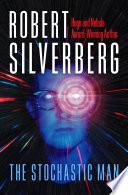
“It’s not a philosophy, Mr. Nichols. It’s an accommodation to the nature of reality.”
Source: The Stochastic Man (1975), Chapter 16 (p. 98)

Hugo and Nebula Award Finalist: This tale of an encounter between a probability expert and a psychic is “a treasure” (San Francisco Examiner). Lew Nichols can predict the future. Not see the future, just make predictions based on research and statistics. Nichols is damn good at it, though, and his accuracy makes him a valuable addition to Paul Quinn’s political campaign for New York City Mayor and possibly the White House. But, when Nichols meets eccentric millionaire Martin Carvajal, predictions suddenly seem petty and flippant. You see, Carvajal can actually see the future—not trends, not options—a signal line of events stretching out ahead. It’s a gift Nichols can learn from this “mentor,” but at what price? Will knowing the future make the present meaningless?
“It’s not a philosophy, Mr. Nichols. It’s an accommodation to the nature of reality.”
Source: The Stochastic Man (1975), Chapter 16 (p. 98)
“Gottfried, like any true dictator, liked to surround himself with bland obliging ciphers.”
Source: The Stochastic Man (1975), Chapter 7 (p. 27)
“We are born by accident into a purely random universe.”
Source: The Stochastic Man (1975), Chapter 1, (p. 1; opening words)
“Thus does the unyielding, inescapable future ineluctably devour the present.”
Source: The Stochastic Man (1975), Chapter 29 (p. 161)